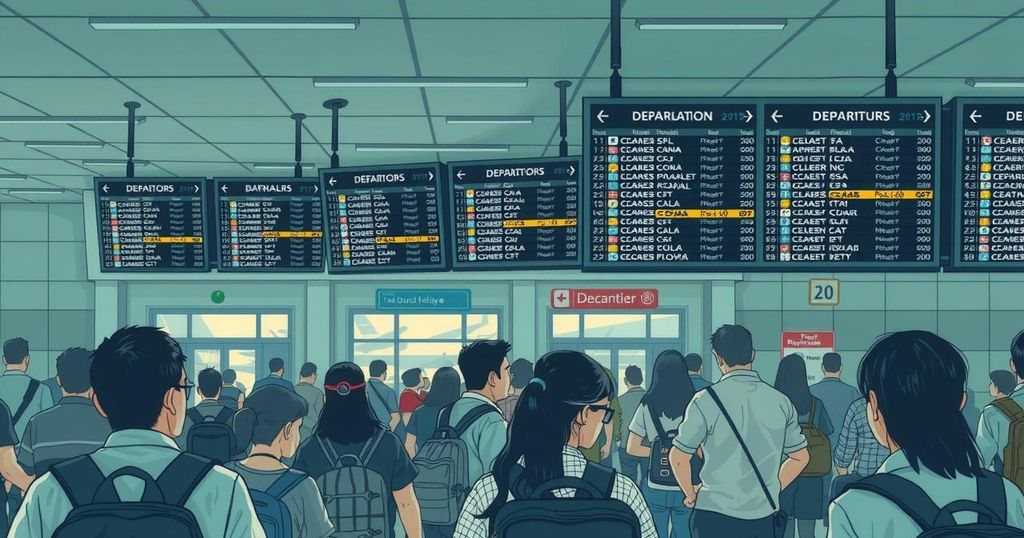Travel Ban Reinstated by Trump: A Turbulent Turn for International Travel
President Trump has reinstated a sweeping travel ban targeting over a dozen countries, sparking concerns about global mobility and international relations. The ban affects travelers from nations including Cuba, Burma, and Venezuela, causing immediate implications for the U.S. tourism industry, airlines, and legal challenges. Reactions are building globally as many stakeholders question the long-term impact of these restrictions on society and diplomacy.
In a significant escalation of travel restrictions, President Donald Trump has revived the travel ban, further complicating the already tumultuous landscape of U.S. immigration policy. This newly reinstated ban affects travelers from several countries including Cuba, Burma, and Venezuela, among others. As the global travel community braces for disruptions, there are increased concerns about how this will impact international mobility, business dealings, and even educational opportunities for students abroad. The renewed ban is not merely a relic of the past but a broadening of restrictive measures expected to unsettle both the travel industry and diplomatic relations.
Beginning at 12:01 a.m. on Monday, the ban prohibits entries from thirteen nations entirely while also imposing added restrictions on eight more. The countries targeted now include Afghanistan, Chad, Libya, and Syria, among others. Critics express alarm over the geopolitical implications of these actions and the potential for unrest among communities that share ties and longstanding relations with the United States. Tour operators and airlines are left to grapple with the repercussions, not just for travelers but for the economy overall.
Airports across the country are preparing for a chaotic response mirroring the confusion of 2017 when the first travel ban was enacted. Air carriers are inundated with last-minute flight changes and requests for rebooking, while immigration officials gear up to implement new protocols dictated by the updated policies. The ripple effect can be disastrous for the tourism industry that has only just started to recover from the COVID-19 pandemic. Immediate cancellations and a fall in international ticket sales are anticipated to be significant problems ahead.
As the ban primarily affects countries known for their diaspora populations in the U.S., businesses that rely heavily on international visitors are already sounding the alarm. Hotels, travel agencies, and other sectors linked to tourism brace for a loss of revenue from visitors who traditionally contribute to the economy through various means, from family visits to cultural tourism. This sudden downturn is particularly disheartening as summer travel plans teeter in uncertainty for countless travelers who may have arranged their trips around business and family commitments.
International reactions to the reinstated ban are poised to add even more complexity to U.S. foreign relations. Countries impacted may retaliate with their own restrictions on U.S. citizens or issue travel advisories, which could exacerbate the diplomatic fallout. The repercussions could disrupt ongoing negotiations centered around trade, humanitarian efforts, and security matters. Several stakeholders—from educators to representatives from aid organizations—are urging for prompt reconsideration of the policy that risks damaging the goodwill built through years of cultural exchanges.
Furthermore, legal challenges are expected to surface almost immediately. Advocacy groups are gearing up to contest the travel ban in court, citing potential violations of civil rights and due process. Trump’s earlier travel restrictions faced similar scrutiny, and the legal ramifications could create a battleground reminiscent of past debates regarding executive authority on immigration.
Travel booking platforms face mounting pressure as they navigate the new regulations and attempt to keep customers informed. With travel planning shifting from routine to crisis management, advisors must now delicately balance the logistical challenges and the emotional toll on clients disrupted by these policies. Many individuals have longstanding connections to the U.S. and find themselves caught up in bureaucratic red tape and uncertainty.
Ultimately, this reinstated travel ban signifies a regression in global mobility just as the world begins to step out of a period of isolation due to the pandemic. The tourism industry, which has often been heralded as a medium for fostering international harmony and understanding, now stands at a crossroads.
As the details of this policy continue to unfold, it is evident that this summer will not only be marked by travel and exploration but also by the stark reality of barriers going up when the demand for connection is at its peak. The world’s response to these bans will be pivotal in shaping the future travel landscape and international relations.
President Trump’s revived travel ban poses significant disruptions to many sectors, particularly the U.S. tourism industry and international relations. The restrictions affect numerous countries, creating confusion and logistical challenges while igniting legal disputes once more. As the situation unfolds, it raises critical concerns around global mobility and the relationships between nations at a time when collaboration is needed. The consequences of this revamped policy will likely be felt for quite some time, marking it as a pivotal moment in travel policy history.
Original Source: www.travelandtourworld.com




Post Comment